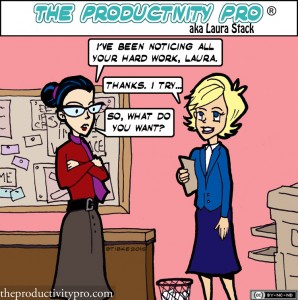“It is literally true that you can succeed best and quickest by helping others to succeed.” — Napoleon Hill, motivational writer.
Who owns team productivity?
If you’re not the boss, how could you boost your teammates’ productivity? This assumes you have the right to assess the quality of their work in the first place, and to interfere with their jobs. After all, it’s one thing to ask for help, and something else altogether to have it thrust upon you.
But team productivity truly belongs to everyone on the team, at every level. You don’t need to force your help on your teammates—just make their jobs easier for them, and act as a role model for those willing to pay attention.
Try these ways of helping your teammates:
- Adopt a pleasant attitude. I’m sick of hearing “nice guys finish last,” because it’s a pile of malarkey. Your emotional state inevitably affects other people; surliness sours moods, but friendliness lifts the spirit. Be open, honest, and nice to your teammates. It won’t kill you, and even if you have a bad day and have to fake it, you’ll probably eventually “make” it anyway. This may be your simplest way to increase team productivity, so check your negativity at the door.
- Quiet down. Most of us work in open plan offices, where we have to listen to conversations, machine noise, slamming doors, papers rustling, and people walking around. We have enough sound pollution to deal with. Keep quiet so you don’t add to the distractions, and don’t talk loudly right outside people’s doors. Have situational awareness!
- Brush up on your people skills and make friends with everyone on the team. Even if you prefer to keep to yourself, you’re better off making yourself a solid team player. Join people for lunch in the break room, ask about their families over the water cooler, buy them birthday cards, get together a group to go out for lunch—and talk. That’s the simplest way to share your ideas, and people who like each other work more effectively, especially when the chips are down.
- If you discover a useful tool, strategy, or process pass it on. Alternate work strategies and new ways to do certain tasks may prove the most effective, but just make suggestions; you can’t force anyone to try them. Suggest them during socializing sessions, like lunch or your coffee break.
- Offer to help. When you have an opening in your schedule, help a teammate catch up on something that’s slowed them down—especially if it’s blocking your workflow and causing your opening in the first place. Just make the offer; don’t force your help on someone.
- Get your deliverables to your teammates on time. If team workflow depends on you meeting your schedule so someone else on the team can get their work done, don’t let yourself become a bottleneck. No one should ever have to twiddle their thumbs waiting for you. Ask for help if necessary, and retool your personal workflow process so you can get your work done on time.
- Improve your communication skills. Make everyone you work with aware of exactly what you want from them and when. Let your teammates know when to expect your contributions, so they can plan on them. Repeat this information, even at the risk of over-repeating, and ask questions if you don’t understand what someone needs. Urge them to do the same with you.
- Head off problems at the pass. Part of exercising communication skills is making sure you avoid problems between you and your teammates. But if you feel trouble brewing anyway, cut it off by openly discussing the issue with the appropriate teammate in private. Never complain to someone else; you’ll just make matters worse. If you can get problems out into the open, you can fix them.
- Get involved and own decisions. Be an integral part of all team initiatives from the word Go. In some cases, you may function best as a Devil’s Advocate, challenging something that seems unwise; but if the team decides to do it anyway, get onboard and support it fully.
- Don’t brag. Even if you know for a fact you’ve done a great job of improving team productivity, don’t sprain your shoulder patting yourself on the back. We all want recognition, but be an adult about it. If the others feel you deserve recognition, you’ll get it. Even if they gloss over your accomplishments, shake it off.
The Toughest Job
As Tom Peters points out, “Today we live in a project world—and if you’re in a project world, you’ve got to be a great teammate.”
Helping your teammates shine may be one of the toughest jobs possible in a team environment. You may not always get the attention and appreciation you deserve. This doesn’t mean you should give up or fade into the background; if your teammates shine, you can bask in the reflected glory, and everyone who matters will know you’re a valued member of the team—a real team player who boosts everyone from good to great, or even from great to excellent. If nothing else, you’ll know, and you can add one more accomplishment to your resume.
© 2015 Laura Stack. Laura Stack, a.k.a. The Productivity Pro®, helps professionals achieve Maximum Results in Minimum Time®. For over 20 years, her keynote speeches and workshops have helped leaders boost personal and team productivity, increase results, and save time at work. Laura is the author six books, most recently Execution IS the Strategy. Widely regarded as one of the leading experts in the field of performance and workplace issues, Laura has been featured in the Wall Street Journal, the New York Times, and USA Today. Connect via her website, Facebook, or Twitter.



